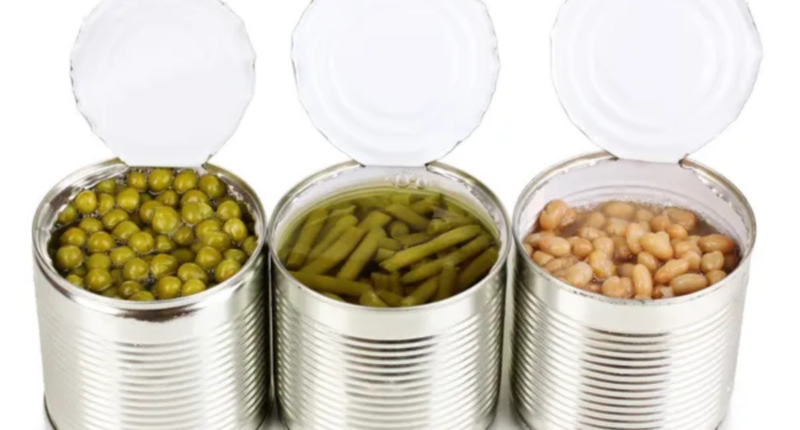While canned food appears to be a quick meal with extended shelf life, there are some disadvantages of canned foods that can potentially impact your health after consumption[1]. Here, Sound Health and Lasting Wealth will explore seven significant drawbacks of canned food that can potentially jeopardize your health. It is important to be aware of these issues so that you can make informed decisions about your dietary choices.
1. Nutrient Loss
One of the primary concerns with canned food is the potential loss of nutrients during the canning process[2]. The high temperatures used to sterilize and preserve the food can degrade certain vitamins and minerals. Additionally, some nutrients, such as vitamin C, are water-soluble and can leach into the liquid within the can, leading to further nutrient loss.
RELATED: How to Conserve Vitamin C During Food Preparation
High Sodium Content
Canned food often contains high levels of sodium, which is used as a preservative and flavor enhancer. Excessive sodium consumption can contribute to hypertension[3], water retention, and other health problems. It is important to read labels carefully and opt for low-sodium or no-salt-added options when possible.
Exposure of Bisphenol A (BPA In Canned Foods)
Many canned foods are lined with a resin that contains bisphenol A (BPA), a chemical[4] used in some canned food linings and known to have negative health effects. Bisphenol A (BPA) has the ability to easily migrate into food sources, particularly when it comes to canned goods and products packaged in polycarbonate containers[5].
It has been linked to health problems such as reproductive problems, heart disease, and cancer. However, the FDA has stated that the levels of BPA in canned foods are safe for human consumption but advisable to choose BPA-free canned products or consider alternative packaging options.
High Sugar Content
Some canned fruits[6] are packed in syrup, which can add a lot of sugar to your diet. For example, a can of peaches in syrup can contain up to 14 grams of sugar[7], which is more than half of the recommended daily intake for adults.
Additives and Preservatives
To extend the shelf life of canned food, manufacturers often add various additives and preservatives. These substances may include artificial colors[8], flavors, and chemical stabilizers. While deemed safe for consumption in regulated amounts, some individuals may be sensitive to these additives or prefer to avoid them altogether.
Limited Variety
Canned food typically offers a limited variety of options compared to fresh or frozen alternatives. Certain fruits, vegetables, and meats may not be readily available in canned form, leading to a less diverse diet. Consuming a wide range of foods[9] is essential for obtaining all the necessary nutrients and maintaining overall health.
Environmental Impact
The production and disposal of canned food can have a significant environmental impact[10]. The manufacturing process requires energy and resources, and the disposal of empty cans adds to waste accumulation. Choosing fresh, locally sourced produce or opting for alternative packaging methods, such as glass or cardboard, can help reduce the environmental footprint associated with canned food.
Risk of Food Contamination
There is a risk of contamination if the can of canned food is damaged, dented, or improperly sealed. Bacterial growth or the presence of toxins can occur in such cases, posing a health hazard to consumers.
According to a report[11], ” Microorganisms may enter through the polluted outside surfaces of filled cans, especially if the cans are wet, or from contaminated cooling water following the heating process. Leakage may also result in a loss of can vacuum, which promotes chemical and microbiological decomposition of the food.”
In addition, some canned foods may be contaminated with lead[12], which is a toxic metal. Lead can cause health problems such as brain damage, learning disabilities, and anemia. It is crucial to inspect cans before use and discard any that show signs of damage or compromise.
Risk of Having Botulism
Botulism[13] is a rare but serious illness caused by a bacteria called Clostridium botulinum. This bacteria can grow in canned foods that have not been properly processed. Symptoms of botulism include nausea, vomiting, difficulty breathing, and paralysis.
Mycotoxins
Mycotoxins are poisonous substances produced by fungi[14]. They can grow on canned foods that have been stored improperly. Symptoms of mycotoxin poisoning include nausea, vomiting, diarrhea, and headaches.
It is important to be aware of the potential dangers of canned foods so that you can make informed choices about your diet. If you do choose to eat canned foods, be sure to choose brands that are low in sodium and sugar, and that do not contain BPA. You should also check the expiration date and make sure that the cans are not damaged before you eat the food.
Caution and Safety Tips
Here are some tips for reducing the risks associated with eating canned foods:
- Choose canned foods that are low in sodium and sugar.
- Look for brands that do not contain BPA.
- Check the expiration date and make sure that the cans are not damaged before you eat the food.
- Rinse canned fruits and vegetables before you eat them.
- Cook canned beans before you eat them.
- Incorporate fresh or frozen alternatives into your diet whenever possible.
- Read ingredient labels and avoid products with excessive additives.
By following these tips, you can reduce the risks associated with eating canned foods and enjoy them as part of a healthy diet.
Tips for Storing Canned Foods
Here are some tips for storing canned foods[15]:
- Store canned foods in a cool, dry place. The ideal temperature for storing canned foods is between 50 and 70 degrees Fahrenheit. If you live in a warm climate, you may need to store your canned foods in a cool, dark basement or pantry.
- Do not store canned foods near heat sources or in direct sunlight. Heat and sunlight can cause the cans to deteriorate and the food to spoil.
- Check the expiration dates regularly and discard any canned foods that are past their expiration date. The expiration date is not an exact science, but it is a good guideline for how long the food will stay fresh.
- Look for signs of spoilage. If a can is leaking, dented, or bulging, do not eat the food. These are signs that the food has spoiled and could be harmful to eat.
- Rinse canned fruits and vegetables before you eat them. Canned fruits and vegetables are often packed in a syrup or brine that can be high in sodium. Rinsing the food before you eat it will help to reduce the sodium content.
- Cook canned beans before you eat them. Canned beans can contain harmful bacteria that can cause food poisoning. Cooking the beans will kill the bacteria and make them safe to eat.
- Do not stack cans too high, as this can put pressure on the cans and cause them to bulge.
- Rotate your canned foods so that you use the oldest ones first.
FAQs
Q: Can all canned foods be harmful to health?
A: Not all canned foods are inherently harmful to health. However, certain factors, such as the presence of additives, high sodium content, and the use of BPA-lined cans, can pose health risks. It is important to read labels, choose healthier options, and consume canned foods in moderation.
Q: Are there any benefits of consuming canned food?
A: While canned food does have its drawbacks, there are some benefits as well. Canned foods are convenient, have a longer shelf life, and can be a more affordable option in certain cases. Additionally, certain nutrients, such as lycopene in tomatoes, are actually more bioavailable in canned form.
Q: Are canned foods nutritious?
A: Canned foods can be a nutritious option, especially if you choose brands that are low in sodium and sugar. Canned fruits and vegetables are often picked at peak ripeness and packed quickly after being harvested, which helps to preserve their nutrients.
Q: Are there any alternatives to canned food?
A: Yes, there are several alternatives to canned food. Fresh produce, frozen fruits and vegetables, and home-cooked meals using whole ingredients are all great alternatives. These options often provide higher nutrient content and give you more control over the ingredients and cooking methods.
Q: Should I completely avoid canned food?
A: It is not necessary to completely avoid canned food, but it is recommended to consume it in moderation and make informed choices. By selecting healthier options, considering alternative packaging, and incorporating a variety of fresh and frozen alternatives, you can strike a balance between convenience and nutrition.
Sources:
- Researchgate
- Canr.msu.edu
- Researchgate
- Researchgate
- Researchgate
- Scielo
- FDC
- NCBI
- NHS
- Researchgate
- Pubmed
- Academia
- CDC
- WHO
- Ucanr









